- Home
- Brian Falkner
Vengeance
Vengeance Read online
Contents
Cover
Blurb
Logo
Allied Combined Operational Group, Recon Team Angel
Desert Prayer
Book One: New Bazadia
Turning Tide
Nokz’z
Salt
Cheshire Moon
Rotorbot
The Tsar
Subterfuge
Book Two: World on Fire
Firefighters
Killing Azoh
Dragon Strike
The Plan
Seven Kinds of Crazy
Nzgali
Inner Sanctum
Book Three: Azoh
The Tunnel
A Toothless Dog
Sacrifice
Mouse Bait
Assault
Redemption
Vengeance
Azoh-zu
July 2, 2035
Glossary
Congratulations
About the Author
Copyright
Dedication
Also in the Series by Brian Falkner
THE TIME HAS COME FOR THE FINAL CONFLICT.
FOR THIRTEEN YEARS THE WAR WITH THE BZADIANS HAS DEVASTATED EARTH.
NOW, FOR THE FIRST TIME, HUMANS MAY HAVE THE UPPER HAND.
THE ANGELS MUST GO BEHIND ENEMY LINES ONCE AGAIN. THIS TIME TO CANBERRA, THE BEATING HEART OF THE BZADIAN EMPIRE.
IT IS THEIR FINAL MISSION: A TOP-SECRET DELIVERY TO A DEEP-COVER SPY.
BUT THERE IS NOTHING MORE DEADLY THAN AN ENEMY BACKED INTO A CORNER.
AND THERE IS NOTHING MORE DANGEROUS THAN THE PURSUIT OF VENGEANCE.
ALLIED COMBINED OPERATIONAL GROUP, RECON TEAM ANGEL
The lifting of the official veil of secrecy, and the subsequent publication of the diary of Lieutenant Trianne Price, has revealed astonishing information about the events at the end of the Bzadian War.
The role that the brave young men and women of Recon Team Angel played in those extraordinary times has never before been fully revealed.
This, finally, is their story.
In March 2033, five Angels went behind enemy lines to the very heart of the Bzadian Empire.
ANGEL ONE: Lieutenant Trianne (Phantom) Price – New Zealand
ANGEL TWO: Specialist Janos (Monster) Panyoczki – Hungary
ANGEL THREE: Specialist Retha Barnard – Germany
ANGEL FOUR: Specialist Dimitri (The Tsar) Nikolaevna – Russia
ANGEL FIVE: Specialist Hayden Wall – United States of America
Many fought, and many fell, in pursuit of liberty for Earth. May their names live on in history.
DESERT PRAYER
[NAZCA VALLEY, PERU, 43 BC]
The snake scraped across the desert floor in front of Ching’wua, in search of water. It stopped, sensing Ching’wua’s presence, and raised its head in his direction. It was small, just a narrow necklace with bands of red, yellow and black. A coral snake: deadly but not aggressive, unless it was desperate.
Ching’wua watched the snake for a moment until it lowered its head and rasped away across the dry stones of the desert.
“Run snake,” he called after it. “Run well, or I will catch you and drink your blood.”
He rubbed the knuckles of his right hand, still bruised and scabbed from the fight the day before. One of the scabs had broken off and was bleeding lightly.
“You, Ching’wua,” a voice came from behind him. “You stop to gossip with the desert?”
Ching’wua said nothing, and took a tight grip on his digging tool. He rammed the sharp end of it into the coarse red stones of the desert, loosening them, then reversed the tool, using the scoop end to lift the stones and reveal the whitish-grey substrate.
The High Born behind him walked up alongside as he spread the red stones across the desert to the side of the digging. Ching’wua glanced up, but only for a second. Any longer would bring the sapling whip down across his shoulders, which were already red and raw from the days of unrelenting sun.
The High Born – his name was Gochua – was a longhead, one of the last. His skull was long and narrow and his eyes were large. He had not been born that way. Only the gods were born that way. At birth, Gochua had had boards strapped to his skull, forcing the bones of his head to grow into the unnatural elongated shape. The High Born did this to their children because it made them look like gods. But they were not gods.
Real gods could fly through the sky like birds. They could heal the sick and change the weather.
The High Born could do none of that.
Looking like a god did not make you a god, Ching’wua thought bitterly, feeling Gochua’s eyes on his back as he hacked again at the red stones.
The true gods had gone many years before, but now, more than ever, they were needed. The rains had stopped. Without the rains, the crops had failed, and that had brought starvation and death to his people. Even now the taste of the snail was sour on his tongue. That had been their only food for days. He would rather have joined the gatherers on their eight-hour walk to the coast, to collect seafood and shellfish, than be here, scratching out a message in the desert to gods who would never come.
The gods will return, the High Born insisted. They will answer our call. They will bring back the rains.
But they had not.
Generations before, the High Born had drawn the first message high on a mountain, where it would be easy for the gods to see: a circle inside a square, the symbol of the gods. But the gods had not seen it. They had not returned.
Now the rains had gone and the High Born had called out to the gods. They had dug pits around the square shape and heaped piles of precious food in them as offerings to the gods. Many people had starved to death to send this message, but still the gods had not listened.
The gods are too far away, the High Born said. Our message must be louder. So they had drawn huge designs on the desert floor: animals, birds, spiders. The lines of the pictures were ten shoulders wide and stretching out of sight into the distance.
But even these giant, silent pleas were ignored.
Ching’wua had heard of other lands, high in the mountains, where fresh water still flowed, and plants and wildlife were abundant. He, and many others, wanted to leave, to seek a new place where his people could live. But the High Born said no, the gods will bring back the rain.
The previous day, Ching’wua had had to fight to defend his family’s water gourd from a villager, crazed with thirst, who had tried to steal it. The man had fought like a cornered jaguar for the water, and much of it had spilled as Ching’wua had wrestled it from the man and beat him into unconsciousness.
He did not blame the man. Thirst could do terrible things to a person.
“We must leave here,” Arua said. He was working next to Ching’wua. Ching’wua glanced quickly at him. Arua looked unsteady on his feet. He seemed tired, his digging tool barely scuffing the surface of the stones. Just yesterday Aura had lost a child, a young girl, to the endless thirst.
“Speak quietly, or not at all,” Ching’wua said. “Gochua is near.”
“I will no longer listen to Gochua,” Arua said, “or any of the other High Born. We will all die if we stay in this place.” His tongue sounded heavy and his words were blurred.
“The High Born say the gods will return,” Ching’wua said.
“The High Born lie,” Arua said.
Ching’wua was silent. He hoped Gochua had not heard that. Accusing the High Born of lying was punishable by death, and it would be a long, slow death.
“The High Born lie,” Arua said again, loudly.
“You, Arua,” Gochua said. “What did you say?”
“He said nothing,” Ching’wua said. “It is just the sun. He babbles.”
“I said you lie,” Arua said. “The gods will not return. We waste our energy and our lives.”
“Take him,” Gochua said, and two soldiers stepped down into the grey-white path. Ching’wua did not see where they came from.
“Ching’wua agrees with me!” Arua shouted as they grasped his arms.
“I said nothing!” Ching’wua cried out, horrified, as Gochua’s gaze turned towards him.
Gochua said nothing but nodded towards Ching’wua. Two more soldiers were suddenly upon him, wrenching at his arms, forcing him up onto the stony ground in front of Gochua, pressing him to his knees.
There was a burst of movement next to him and one of the guards holding Arua staggered backwards. Now somehow Arua was free, running for his life, skidding on the harsh stones.
The first spear missed, whistling through the air over Arua’s head as he slipped and fell, but he was quickly back on his feet and the second spear did not miss, impaling his leg and driving him down into the desert. The third spear entered his stomach and it was then that the writhing and the screaming began.
Gochua’s ceremonial dagger was at Ching’wua’s throat. Ching’wua had been wrong. This would be a quick death. Gochua was only waiting for the attention of the other diggers before slicing the life from Ching’wua’s body. A quick gush of red on the red stones, and Ching’wua would join his ancestors: a skull on a rope carried by a priest.
“I said nothing,” Ching’wua cried again, cursing his bad luck to be digging next to Arua.
“See the non-believer,” Gochua called out to the waiting masses around them. Still Arua flailed and screamed in the distance.
Ching’wua’s heart beat like that of a hummingbird, and his ears were filled with the drumming of his own blood through his body.
“You said nothing, but you thought it,” Gochua said, the blade of the knife slipping a little and cutting the skin at Ching’wua’s throat.
“I said nothing!”
“Did you think it?” Gochua asked, his voice rising to a shout.
Ching’wua no longer saw the High Born. Instead his vision was filled with his wife and their two young sons. If he died, they would die without his protection. To save himself was to save them, but to save himself he would have to lie, because Gochua was right. He had been thinking those things. And a man could not lie before the gods, even if those gods were far, far away.
“I …” He stumbled over his words. “I …”
He could no longer speak; there were no words in his mind or in his throat. The drumming in his ears was louder now and he turned his head, scanning the sky for the symbol of the gods, the circle inside the square. Surely the gods would return in time to stop this madness, this great injustice.
But the skies were clear and empty.
BOOK ONE – NEW BZADIA
War changes technology. Technology changes war.
– General Harry Whitehead
TURNING TIDE
[MISSION DAY 1, MARCH 31, 2033.
0155 HOURS LOCAL TIME]
[TASMAN SEA, OFF THE COAST OF AUSTRALIA]
The “package” sat below, in the cabin, out of sight.
The mission brief was simple. Deliver the package to Canberra. To their former leader, Lieutenant Ryan Chisnall. How quickly things changed, Price thought. A few months ago it would have been unthinkable to have brought the package on this mission. On any mission.
But a few months ago this whole mission was unthinkable.
The world had taken a strange, surreal turn.
“Tacking now,” Angel Two, Sergeant Janos “Monster” Panyoczki, called from the rear of the yacht.
Angel One, Lieutenant Trianne Price, ducked her head, ready for the swing of the boom. It happened suddenly, with a hiss of ropes through pulleys and the shush of the sail, the flapping of the sailcloth as it slackened, then the crack as the ropes snapped tight. It was so loud that Price felt sure the whole world would hear it, although in reality she knew the sound would not travel far.
It seemed odd, yet fitting somehow, that on their third infiltration of New Bzadia they were using one of the oldest modes of travel known to man. A floating hull, pushed by air currents across the sea. It was very low tech in a world of high tech.
Somewhere behind them, the stealth boat that had carried them almost within sight of the Australian coast was now cruising quietly back to its secretive New Zealand base.
Price glanced at the time on her wrist computer. It was not yet 0200 hours. So far they were on track. By 0900 hours, no later, they had to be in Canberra, the beating heart of the Bzadian Empire. They had a package to deliver, and timing on this mission was critical. Perhaps more than on any of their other missions.
The yacht straightened for a second or two as it tacked, then settled back onto a steep, uncomfortable angle. Price had been sitting on the low side of the boat, her back against the railings, but now she was on the high side and had to put an arm over the top rail to stop from slipping off the seat. Her leg itched. The new one, cloned from her own cells by human doctors using Bzadian technology. Supposedly, it was identical to the one she had lost on the Wivenhoe dam, and yet it wasn’t. When she got cold, the leg itched. The doctors said it was all in her mind, and they were probably right, but knowing that didn’t help.
Angel Three, Specialist Retha Barnard and Angel Five, Specialist Hayden Wall, were on the ropes (“sheets” Price remembered her father calling them). Angel Four, Specialist Dimitri “The Tsar” Nikolaevna, was monitoring the scope, checking for alien activity in their vicinity, in the sky or on the water.
So far the only contacts had been three alien aircraft and a drifting, derelict ship.
The aircraft had appeared on the scope a few minutes earlier. They were flying in a group, typical of a coastal air patrol, and so far had shown no sign that they had detected the yacht. The ship was also Bzadian, one of a number that had been attacked by ACOG stealth fighter-bombers the previous day. This tough old trooper had refused to sink and its engines had refused to quit. Satellites had showed it chugging its way in a huge circle that took it halfway to New Zealand and back.
Everything was going according to plan. Price closed her eyes, enjoying the sensation of the boat as it rose and surged against the waves, feeling useless, but not really minding.
It brought back memories. No, not exactly memories, more like vague feelings from those early days of her life. Before it had all changed. Perhaps because of that, this didn’t feel like a mission. It felt like a holiday. That feeling wouldn’t last for long, but for now there was a moment to be enjoyed.
The sail flapped a few times, making a hard, cracking sound.
“Wall, make tighten your rope,” Monster called.
“Your sheet,” Price murmured, looking over at Monster. He stood at the rear of the yacht, feet planted firmly on the deck, his broad shoulders swaying slightly with the movement of the boat. He adjusted the wheel in small amounts, letting the vessel feel its way through the light troughs and swells. He was a rock. Solid; reliable; immovable. Nothing fazed him. He was the crutch that their former lieutenant, Ryan Chisnall, had always leaned on. And so had she.
“Not sheet, rope,” Monster said.
“On a sailboat, the ropes are called sheets,” Price said, and added pointedly, “in English.”
“Whatever is English called, make for tight,” Monster said.
The flapping eased and the sound stopped.
Price could never understand how the native Hungarian could be so fluent in all the major alien dialects, but still couldn’t speak English worth a damn.
“I gather Monster’s not the only one who has done a bit of sailing,” The Tsar said, not taking his eyes off the scope. His face reflected the greenish glow of the screen.
“Maybe a bit,” Price said.
Now The Tsar looked over at her, raising an eyebrow. She smiled with the warmth of the memory. “My dad loved sailing,” she said. “He took me out sometimes. When I was little.�
��
“And then?” The Tsar asked.
She shrugged. “Then he died, and mum’s boyfriend didn’t like sailing. He sold the boat.”
And used the money for gambling and booze, she didn’t say. But it was true. And that holiday feeling had suddenly disappeared.
The sails rustled in an indecisive breeze, then filled again with air. The bow of the yacht lifted and chill sea spray stung her hand. She didn’t mind. After the hell of the Bering Strait midwinter, she would never complain about the cold again.
The spray brought with it the smell of the night ocean: a deep, cleansing smell. Millions of years ago, scientists said, the distant ancestors of the human race had crawled out of the ocean. Maybe that was why humans always felt drawn to it, she thought.
The next puff of breeze brought with it a different smell, the smell of land. Price wasn’t sure how she knew that, but she did. There was a subtle difference between the clean, fresh smell of the night sea air and the musk of nearby land.
The ocean spray was in her nostrils and in her mouth, a slight saltiness. The unadulterated taste of nature. But more than that: it was the taste of freedom.
That thought made her look at the door to the cabin. Freedom meant different things to different people, Price thought, and some people would never be free.
The ship showed up on Zane’s scope well before they crossed the coastline, which was an erratic white line three thousand metres below.
It was a perfect night. Earth’s sky was virtually cloudless and starlight scattered a soft texture across the clear plexiglass roof of the cockpit. Occasionally, he glanced up. One of those stars was home and, although he had never seen it, he still felt an attachment, a kind of magnetism, drawing him towards it. He knew that many other Bzadians felt the same, but that was wasted energy. Their lives were here now. It had been a one-way trip.
The cool night air was smooth, with not a trace of turbulence. It was like gliding on ice.
Out of the corners of his eyes, Zane was aware of the narrow angular shape of Nikoz’s fighter to his left and Shelz’ah’s to his right. All three planes were Razers, the smallest and fastest craft in the Bzadian air fleet. The fastest fighter jets on this planet.

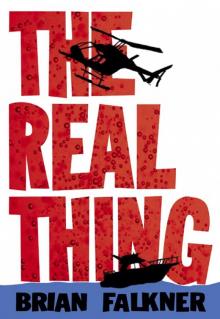 The Real Thing
The Real Thing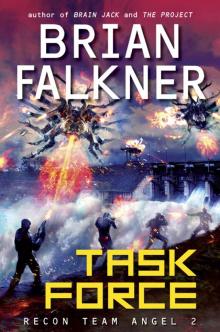 Task Force
Task Force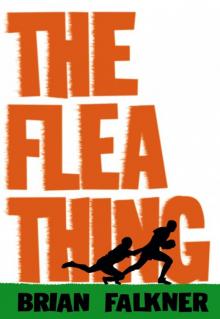 The Flea Thing
The Flea Thing The Project
The Project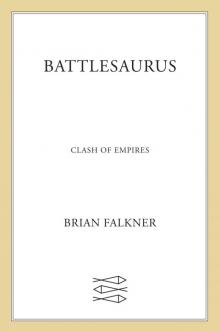 Clash of Empires
Clash of Empires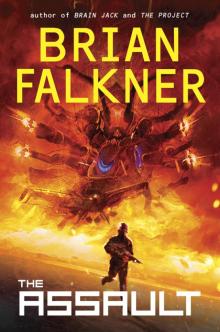 The Assault
The Assault Brain Jack
Brain Jack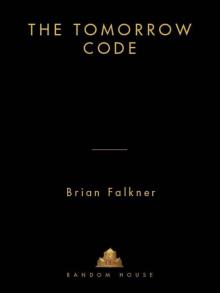 The Tomorrow Code
The Tomorrow Code Vengeance
Vengeance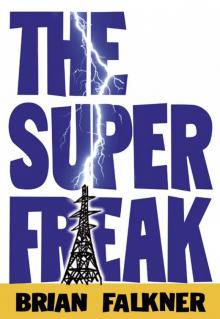 The Super Freak
The Super Freak Northwood
Northwood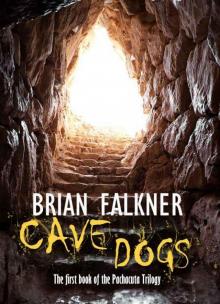 Cave Dogs (Pachacuta Book 1)
Cave Dogs (Pachacuta Book 1)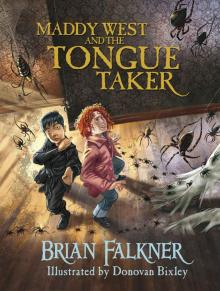 Maddy West and the Tongue Taker
Maddy West and the Tongue Taker